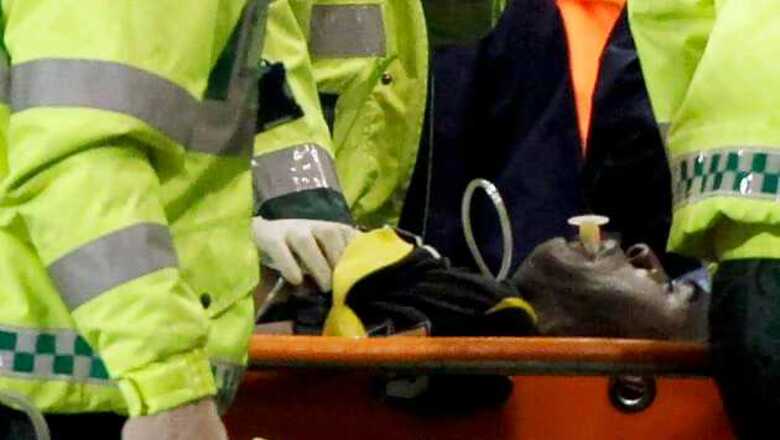
views
London: English soccer player Fabrice Muamba began breathing independently and responding to family members on Monday, showing significant signs of recovery in intensive care two days after suffering a cardiac arrest during a match.
The 23-year-old Bolton midfielder collapsed on the field just before halftime at Tottenham on Saturday. Initial attempts to resuscitate him were unsuccessful, and his heart started beating on its own again only later in the hospital.
For two days, amid an outpouring of global support, Muamba remained in critical condition in intensive care in a heart attack unit, and his long-term prognosis was uncertain.
But the Congo-born player made progress throughout Monday, with medics no longer describing his condition as "critical" by the evening.
"He is continuing to show signs of improvement this evening," Bolton and the London Chest Hospital said in a joint statement. "He is now able to breathe independently without the aid of a ventilator. He has also been able to recognize family members and respond to questions appropriately.
"These are all positive signs of progress. However, his condition remains serious and the medical staff in intensive care will continue to monitor and treat him."
Muamba's friend, Curtis Codrington, said the family told him the player was speaking "minimal words in English and French, which is better than nothing." That was later confirmed by Chelsea midfielder Michael Essien after a hospital visit.
The player's fiancee reflected the optimism of the medics.
"All your prayers are working people thank u so so much," Shauna Muamba wrote on Twitter. "Every prayer makes him stronger. To God be the glory."
The couple has a 3-year-old son, Joshua, and became engaged on Valentine's Day.
Bolton manager Owen Coyle said earlier Monday that Muamba, who has played 33 matches for England's under-21 team, had been putting up a "brave fight."
"There is a real hope he can come through this. When situations like this occur there is a real strength, a real unity, a real togetherness ... that has given (the family) an incredible energy," Coyle said outside the east London hospital.
"That source of energy that everyone is giving off is really bringing them together as a family, and that is important for Fabrice's well-being."
Muamba, a former Arsenal and Birmingham player, fled to England with his family in 1999 to escape the civil war in Congo.
"When you look what he has come through in his life, already he is a natural fighter. He is a physically fit young man," Coyle said. "If those things can help at all, it will be a source of help and encouragement."
FIFA President Sepp Blatter wrote to Bolton chairman Phil Gartside on Monday to wish Muamba "strength as he continues to fight to recover."
"Moments like these show us what is truly important in life and also illustrate the great solidarity that exists between football fans in times of trouble," Blatter wrote. "The football family's thoughts and prayers are with Fabrice's family, club and loved ones at this difficult time."
There is also concern in Muamba's homeland.
"We pray he recovers his health," Congo football federation president Omari Selemani told The Associated Press by telephone. "We are with him in heart and especially with his family at this difficult moment. Being of Congolese origin, it makes our country proud having a player from Congo playing abroad."
Bolton's next match, at Aston Villa on Tuesday in the Premier League, has been postponed. The team is scheduled to play Blackburn on Saturday, and then could face Tottenham next week at White Hart Lane to replay the FA Cup quarterfinal match that was abandoned on Saturday.
"I know the decision will have to be made, but the immediate thoughts are with Fabrice," Bolton captain Kevin Davies said about the possibility of his team pulling out of the FA Cup. "I'm sure the club will take a stance on it in the next couple of days."
At Tottenham, players were due to undergo tests for potential heart defects, with cardiologist Sanjay Sharma saying "the players have all demanded cardiac screening" at a planned routine visit on Monday.
"That involves taking a history relating to cardiac symptoms, which include chest pain during exertion or breath which is disproportionate to the amount of exercise being performed and blackouts, (and) asking about a family history because many of these conditions that can cause cardiac arrest are hereditary," Sharma said.
"We then perform a cardiac examination and following that we do an ECG (electrocardiogram), which is an electrical tracing of the heart which looks for electric faults of the heart, and a cardiac ultrasound, which looks at heart muscle problems or problems with the heart values."















Comments
0 comment